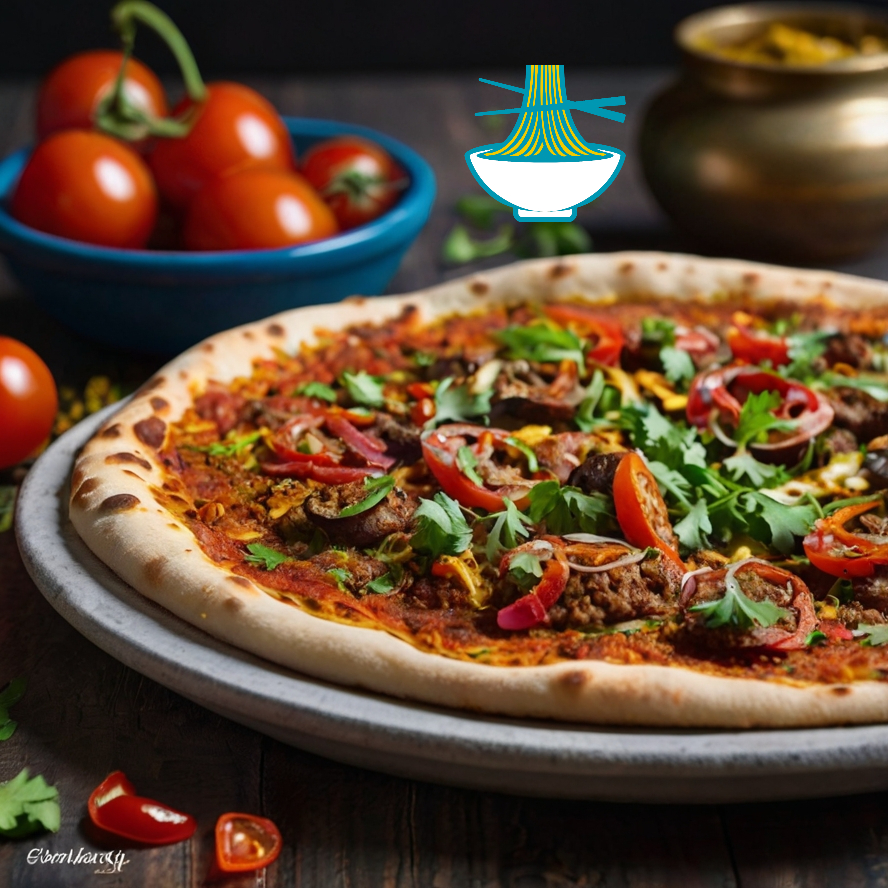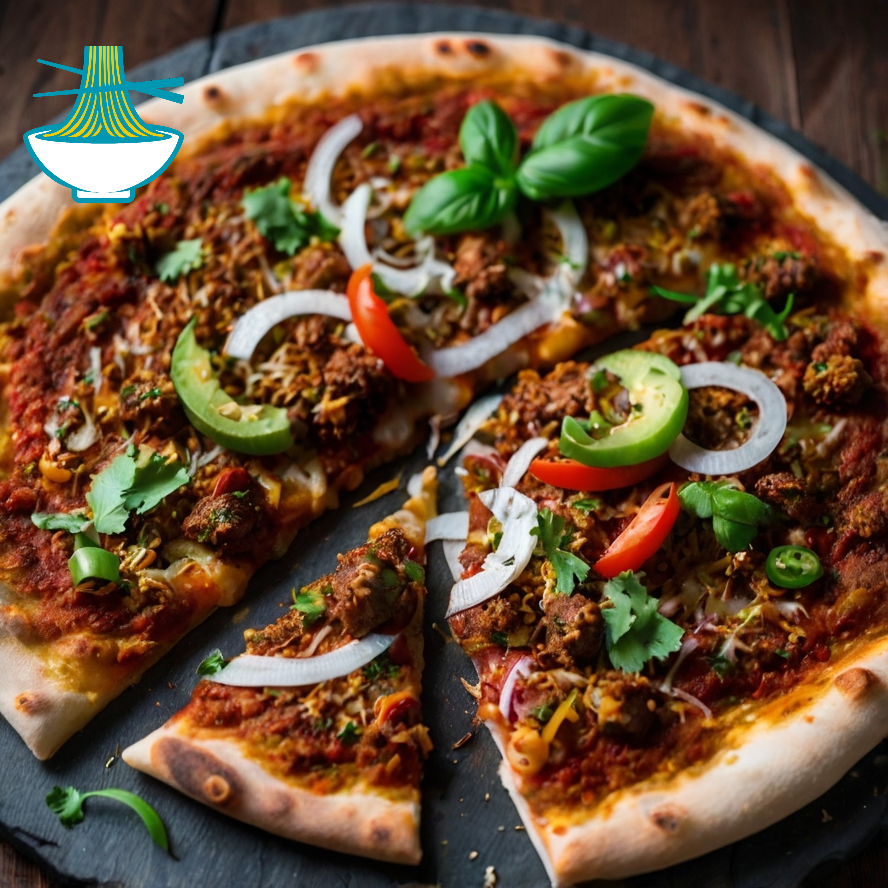Lahmacun is a popular Turkish dish, akin to pizza, featuring a thin flatbread topped with a savory mixture of minced meat, vegetables, and herbs. Its history traces back centuries, originating from the Middle East. It's believed to have been influenced by Arabic cuisine and later adopted and adapted by Turkish culture. Lahmacun is enjoyed as a flavorful street food or as a meal, often served with fresh vegetables and a squeeze of lemon juice.
Ingredients:
- 1 lb (450g) minced lamb or beef
- 2 medium onions, finely chopped
- 3 tomatoes, diced
- 2 cloves garlic, minced
- 1 red bell pepper, finely chopped
- 1/4 cup (60ml) tomato paste
- 2 tablespoons olive oil
- 1 tablespoon paprika
- 1 tablespoon ground cumin
- 1 teaspoon ground cinnamon
- Salt and pepper to taste
- Fresh parsley, chopped (for garnish)
- Lemon wedges (for serving)
- Thin flatbreads (store-bought or homemade)
Method:
1. Preheat your oven to 450°F (230°C).
2. In a large mixing bowl, combine the minced meat, onions, tomatoes, garlic, red bell pepper, tomato paste, olive oil, paprika, cumin, cinnamon, salt, and pepper. Mix well until all ingredients are evenly incorporated.
3. Divide the meat mixture into equal portions and spread each portion thinly over the flatbreads, leaving a small border around the edges.
4. Place the prepared lahmacun on a baking sheet and bake in the preheated oven for 8-10 minutes, or until the edges are crisp and the meat is cooked through.
5. Remove from the oven and garnish with chopped parsley. Serve hot with lemon wedges on the side.
Enjoy your homemade lahmacun!
Nutrition Value:
1. Minced lamb or beef (1 lb / 450g):
- Calories: Approximately 1300-1500 kcal
- Carbohydrates: 0g
- Protein: Around 100g
- Fat: Around 100g
- Sodium: Varies depending on seasoning
- Cholesterol: Around 300-400mg
- Vitamins and minerals: Rich in B vitamins (especially B12), zinc, iron, and selenium.
- Nutritional benefits: Excellent source of high-quality protein, iron for healthy blood, zinc for immune function, and B vitamins for energy metabolism.
2. Onions (2 medium onions, finely chopped):
- Calories: Approximately 90 kcal
- Carbohydrates: Around 20g
- Protein: Around 2g
- Fat: 0g
- Sodium: Around 5mg
- Cholesterol: 0mg
- Vitamins and minerals: Good source of vitamin C, vitamin B6, and manganese.
- Nutritional benefits: Onions contain antioxidants, particularly quercetin, which may have anti-inflammatory and anti-cancer properties.
3. Tomatoes (3 tomatoes, diced):
- Calories: Approximately 75 kcal
- Carbohydrates: Around 15g
- Protein: Around 3g
- Fat: 0g
- Sodium: Around 10mg
- Cholesterol: 0mg
- Vitamins and minerals: Excellent source of vitamin C, potassium, and vitamin K.
- Nutritional benefits: Tomatoes are rich in antioxidants like lycopene, which is linked to heart health and may reduce the risk of certain cancers.
4. Garlic (2 cloves, minced):
- Calories: Approximately 10 kcal
- Carbohydrates: Around 2g
- Protein: Around 0.5g
- Fat: 0g
- Sodium: Around 1mg
- Cholesterol: 0mg
- Vitamins and minerals: Contains vitamin C, vitamin B6, and manganese.
- Nutritional benefits: Garlic has potent medicinal properties, including immune-boosting and antimicrobial effects.
5. Red bell pepper (1 red bell pepper, finely chopped):
- Calories: Approximately 30 kcal
- Carbohydrates: Around 7g
- Protein: Around 1g
- Fat: 0g
- Sodium: Around 2mg
- Cholesterol: 0mg
- Vitamins and minerals: Excellent source of vitamin C, vitamin A, and vitamin B6.
- Nutritional benefits: Red bell peppers are rich in antioxidants, particularly vitamin C, which supports immune function and skin health.
6. Tomato paste (1/4 cup / 60ml):
- Calories: Approximately 45 kcal
- Carbohydrates: Around 10g
- Protein: Around 2g
- Fat: 0g
- Sodium: Around 300mg
- Cholesterol: 0mg
- Vitamins and minerals: Contains vitamin C, vitamin K, and potassium.
- Nutritional benefits: Tomato paste is concentrated, providing the nutritional benefits of tomatoes in a smaller volume, including antioxidants and vitamins.
7. Olive oil (2 tablespoons):
- Calories: Approximately 240 kcal
- Carbohydrates: 0g
- Protein: 0g
- Fat: Around 28g
- Sodium: 0mg
- Cholesterol: 0mg
- Vitamins and minerals: Rich in monounsaturated fats and vitamin E.
- Nutritional benefits: Olive oil is heart-healthy, containing monounsaturated fats that may reduce the risk of heart disease, and is also a source of antioxidants.
8. Paprika (1 tablespoon):
- Calories: Approximately 20 kcal
- Carbohydrates: Around 4g
- Protein: Around 1g
- Fat: 0g
- Sodium: Around 2mg
- Cholesterol: 0mg
- Vitamins and minerals: Contains vitamin A, vitamin E, and vitamin B6.
- Nutritional benefits: Paprika adds flavor and color to the dish and contains antioxidants like carotenoids.
9. Ground cumin (1 tablespoon):
- Calories: Approximately 20 kcal
- Carbohydrates: Around 3g
- Protein: Around 1g
- Fat: Around 1g
- Sodium: Around 10mg
- Cholesterol: 0mg
- Vitamins and minerals: Contains iron, manganese, and vitamin B6.
- Nutritional benefits: Cumin may aid digestion and has antioxidant and anti-inflammatory properties.
10. Ground cinnamon (1 teaspoon):
- Calories: Approximately 6 kcal
- Carbohydrates: Around 2g
- Protein: 0g
- Fat: 0g
- Sodium: Around 1mg
- Cholesterol: 0mg
- Vitamins and minerals: Contains small amounts of calcium and manganese.
- Nutritional benefits: Cinnamon adds a warm flavor and may have anti-inflammatory and blood sugar-regulating effects.
11. Salt and pepper (to taste):
- Salt: Sodium content varies based on the amount used. Recommended daily intake is less than 2300 mg.
- Pepper: Negligible in terms of calories and nutrients.
- Nutritional benefits: Salt enhances flavor but should be consumed in moderation to avoid excessive sodium intake. Pepper adds flavor without adding calories and may have antioxidant properties.
12. Fresh parsley, chopped (for garnish):
- Calories: Approximately 1 kcal per tablespoon
- Carbohydrates: Around 0.2g
- Protein: Around 0.1g
- Fat: 0g
- Sodium: Around 1mg
- Cholesterol: 0mg
- Vitamins and minerals: Excellent source of vitamin K, vitamin C, and vitamin A.
- Nutritional benefits: Parsley adds freshness and color to the dish and is rich in antioxidants and vitamins.
13. Lemon wedges (for serving):
- Calories: Approximately 2 kcal per wedge
- Carbohydrates: Around 1g
- Protein: 0g
- Fat: 0g
- Sodium: Negligible
- Cholesterol: 0mg
- Vitamins and minerals: Excellent source of vitamin C.
- Nutritional benefits: Lemon adds acidity and brightness to the dish and is a good source of vitamin C, which supports immune function and skin health.
14. Thin flatbreads (store-bought or homemade):
- Nutritional content varies widely based on ingredients and brands.
- Typically, thin flatbreads are lower in calories and carbohydrates compared to thicker bread options.
- Look for whole grain or whole wheat options for added fiber and nutrients.
These nutritional breakdowns provide insight into the components of the lahmacun recipe, helping to understand their contributions to the overall nutritional profile of the dish. Adjustments can be made based on dietary preferences and health considerations.


Comments